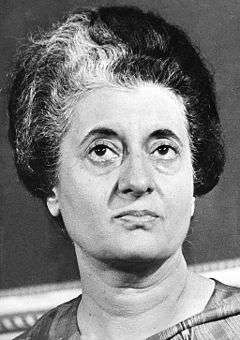Indian general election, 1980
Indian general election, 1980

|
|
|
|
|
|
|
India held general elections to the 7th Lok Sabha in January,1980. The Janata Party alliance came into power after the elections to the 6th Lok Sabha held in 1977, riding the public anger against the Congress and the Emergency but its position was weak. The loose coalition barely held on to a majority with only 295 seats in the Lok Sabha and never quite had a firm grip on power.
Bharatiya Lok Dal leader Charan Singh and Jagjivan Ram, who had quit the Congress, were members of the Janata alliance but they were at loggerheads with Prime Minister Morarji Desai. The tribunals the government had set up to investigate human rights abuses during the Emergency appeared vindictive and a witch-hunt against Congress leader Indira Gandhi, who lost no opportunity of portraying herself as a harassed woman.
Finally, the Janata Party, an amalgam of socialists and nationalists, split in 1979 when several coalition members such as the Bharatiya Lok Dal plus several members of the erstwhile Socialist Party withdrew support to the government. Subsequently, Desai lost a trust vote in parliament and resigned. Charan Singh, who had retained some partners of the Janata alliance, was sworn in as Prime Minister in June 1979. Congress promised to support Singh in parliament but later backed out just two days before the Govt was scheduled to prove its majority on the floor of Lok Sabha. Charan Singh, forced to resign, called for elections in January 1980 and is the only Prime Minister of India never to have faced parliament. During the run up to the general elections Indira Gandhi' s leadership faced a formidable political challenge from a galaxy of regional satraps and prominent [1] leaders of Janta party like Satyendra Narayan Sinha & Karpuri Thakur in Bihar, Ramakrishna Hegde in Karnataka, Sharad Pawar in Maharashtra, Devi Lal in Haryana & Biju Patnaik in Orissa.However, internal feud between Janata Party leaders and the political instability in the country worked in favour of Indira Gandhi's Congress (I), that reminded voters of the strong government of Indira Gandhi during campaigning.
In the ensuing elections, the Congress (I) won 353 Lok Sabha seats in January 1980 and the Janata Party, or what remained of the alliance, won only 31 seats, whereas Charan Singh's Janata Party (secular) won 41 seats. The Janata Party alliance continued to split over the subsequent years but it had recorded in 1977 a few important landmarks in the political history of India: it was the first coalition to govern India, and proved that the Congress could be defeated.
Results
| Party |
Votes |
% |
Seats |
+/– |
|---|
| Indian National Congress (Indira) | 84,455,313 | 42.69 | 353 | +200 |
| Janata Party | 37,530,228 | 18.97 | 31 | –264 |
| Janata Party (Secular) | 18,574,696 | 9.39 | 41 | New |
| Communist Party of India (Marxist) | 12,352,331 | 6.24 | 37 | +15 |
| Indian National Congress (Urs) | 10,449,859 | 5.28 | 13 | New |
| Communist Party of India | 4,927,342 | 2.49 | 10 | +3 |
| All India Anna Dravida Munnetra Kazhagam | 4,674,064 | 2.36 | 2 | –16 |
| Dravida Munnetra Kazhagam | 4,236,537 | 2.14 | 16 | +14 |
| Shiromani Akali Dal | 1,396,412 | 0.71 | 1 | –8 |
| Revolutionary Socialist Party | 1,285,517 | 0.65 | 4 | 0 |
| All India Forward Bloc | 1,011,564 | 0.51 | 3 | +1 |
| Jammu & Kashmir National Conference | 493,143 | 0.25 | 3 | +1 |
| Indian Union Muslim League | 475,507 | 0.24 | 2 | 0 |
| Peasants and Workers Party | 470,567 | 0.24 | 0 | –5 |
| Republican Party of India (Khobragade) | 383,022 | 0.19 | 0 | –2 |
| Kerala Congress | 356,997 | 0.18 | 1 | 0 |
| Republican Party of India | 351,987 | 0.18 | 0 | 0 |
| Socialist Unity Centre of India | 307,224 | 0.16 | 0 | 0 |
| Jharkhand Party | 254,520 | 0.13 | 1 | +1 |
| All India Muslim League | 196,820 | 0.10 | 0 | New |
| United Democratic Front | 140,210 | 0.07 | 0 | –1 |
| Shiv Sena | 129,351 | 0.07 | 0 | New |
| Maharashtrawadi Gomantak Party | 127,188 | 0.06 | 1 | 0 |
| Tripura Upajati Juba Samiti | 111,953 | 0.06 | 0 | 0 |
| Peoples Party of Arunachal | 69,810 | 0.04 | 0 | New |
| Akhil Bharatiya Ramrajya Parishad | 61,161 | 0.03 | 0 | 0 |
| Peoples Conference | 53,891 | 0.03 | 0 | New |
| Manipur Peoples Party | 49,277 | 0.02 | 0 | 0 |
| Bharatiya Socialist Party | 39,399 | 0.02 | 0 | New |
| Shoshit Samaj Dal (Akhil Bharatiya) | 38,226 | 0.02 | 0 | 0 |
| Sikkim Janata Parishad | 31,750 | 0.02 | 1 | New |
| Muslim Majlis | 26,363 | 0.01 | 0 | New |
| All India Labour Party | 14,720 | 0.01 | 0 | 0 |
| All Party Hill Leaders Conference | 13,058 | 0.01 | 0 | New |
| Sikkim Congress (Revolutionary) | 11,632 | 0.01 | 0 | New |
| Sikkim Prajatantra Congress | 5,125 | 0.00 | 0 | New |
| Independents | 12,717,510 | 6.43 | 9 | 0 |
| Invalid/blank votes | 4,928,619 | – | – | – |
| Total | 202,752,893 | 100 | 529 | –13 |
| Registered voters/turnout | 356,205,329 | 56.92 | – | – |
| Source EIC |
See also
References
- ↑ http://m.indiatoday.in/story/as-general-elections-loom-large-new-four-party-united-front-formed-to-counter-congi/1/371984.html

.jpg)
.jpg)